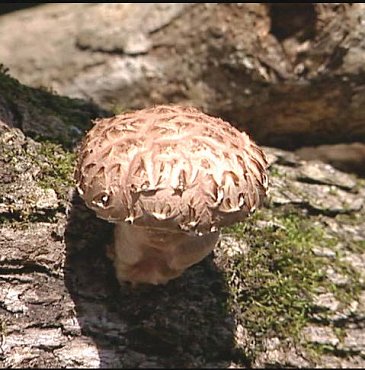AgEBB-MU CAFNR Extension
Green Horizons
Volume 21, Number 1
January 2017
Agroforestry
Mushrooms—From Your Woodlot to the Market Place
By Gregory O. Mori| University of Missouri Center for Agroforestry
Early last year, I shared with Green Horizon's readers some thoughts on the potential benefits of forest-farmed mushrooms (Volume 20, Page 5). We thought it timely to present some additional information on marketing shiitake and other woods-grown mushrooms. Whether you are a small farm adding Shiitake mushrooms as an additional crop or you are approaching shiitake cultivation as a primary enterprise, making it profitable depends both on how efficiently the operation is run and your access to adequate markets.
It is recommended, at least initially, that you structure your log-grown mushroom operation around shiitake as a proven producer with solid market potential. Other mushrooms that can also be grown in a forest farming operation, such as oyster, wine-cap, or more challenging species, such as Lion's Mane, Reishi and Maitake, can be added and expanded as you become more successful at growing and marketing them. After having made the investment and done all the hard work to start producing mushrooms, make sure you don't only then begin asking yourself: "Great, now where am I going to sell them?" As with most any enterprise, it is important to have a thorough understanding of the actual market conditions from the beginning.
Performing a market assessment is essential. This involves a comprehensive analysis of the current environment in which you intend to sell. Ask questions about where and how you sell your product, and who are your customers? Get to know your customers and understand them! How will your product be distributed? What does the competition look like? You may find that the area you are targeting already has many other existing producers or is fully saturated. What are the market trends? Is there untapped potential in the market, do trends look favorable for further expanding the market? Also, make sure you are fully aware of any regulations in your area that might impact your ability to grow and sell mushrooms.
The reality is, your market assessment is never "done." Regular monitoring of market trends and opportunities should be an ongoing effort. Sales is but one, albeit important, component of your marketing efforts. In addition, you will need to consider packaging, presentation, pricing and how to promote and position your product.
 |
A single shiitake mushroom growing on a log. |
Shiitake producers can sell their product at many venues and through many channels. Ask yourself, will you be selling directly to consumers at farmer's markets, at your farm stand or through some other channel such as online sales? The highest prices can be obtained through direct sales at farmer's markets or farm stand sales. Prices can range between $8 - $15/lb, with some growers getting as high as $20/lb in larger east coast cities. However, $10-12/lb is probably more realistic for most growers. As in all things, refining your packaging, presentation and sales finesse can make a big difference in attracting buyers and obtaining the best prices. All of these take considerable time and effort.
Getting those premium prices, requires engagement with your customers and public education about the superior taste and quality of log-grown mushrooms as well as the many health benefits (cite actual research that documents these). Other options for marketing your product include developing accounts with local restaurants, hotels, gourmet food shops and grocery stores. Remember though, as a producer of log-grown mushrooms, you are always competing against larger indoor commercial sawdust-grown operations able to place a consistent supply of lower priced (but lesser quality) products in the supermarkets. A grower ready to scale up production to larger volumes might consider seeking a wholesale arrangement with a produce distributor. I regularly check in with a grower running a 3,000 log operation who doesn't enjoy direct marketing and engagement with the public. Instead, he has secured a stable contract with a regional produce distributor/trucking company and sells nearly all his production, granted at a lower than retail price, through that channel. He spends almost no time on marketing or engaging with customers. Nice work if you can get it, but with "all his eggs in one basket" he is at significant risk should he ever lose that contract. The reality is, most producers will need to devote significant time and effort to the full range of marketing activities.
Remember also, shiitake mushrooms are easily dried and can be packaged and sold in this form (preferred by many Asian consumers) or further processed into soup mixes, tinctures or other value-added products. Some growers have also added to their business by selling pre-inoculated logs to hobbyists and enthusiastic customers. As you build your business, don't hesitate to seek appropriate technical guidance from your local extension agent or advice from business development specialists.
